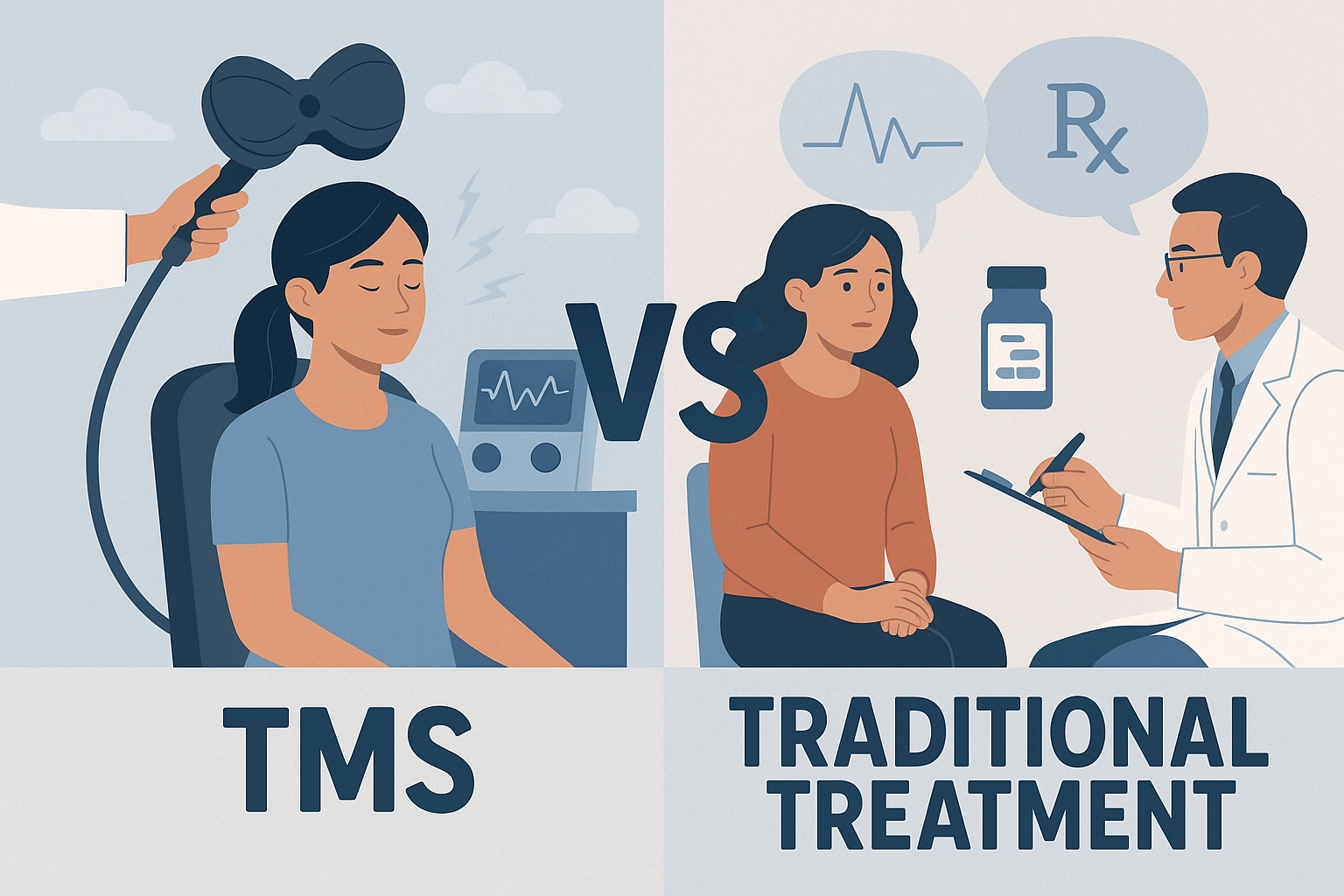You can only try so many antidepressants before you start wondering: What else is out there? For people stuck in that cycle, Transcranial Magnetic Stimulation (TMS) is a medically approved treatment for depression that’s gained serious traction, especially for people who’ve tried therapy or medications without much relief.
Still, it’s fair to ask: How does TMS compare to traditional treatments? If you’re looking for something that works long term, which path gives you the best shot at feeling better and staying better?
What Is TMS?
TMS works by delivering magnetic pulses to key brain regions linked to mood control. The left dorsolateral prefrontal cortex, often underactive in people with major depression, is the main area targeted during TMS treatment.
Unlike medication, TMS doesn’t travel through your bloodstream or tweak your entire system. It’s targeted. Treatment happens in a clinical setting. No anesthesia, no recovery time. People drive themselves home after. A typical course might run five days a week for four to six weeks, depending on the protocol.
But what makes TMS so interesting is the results.
In a 2024 clinical trial published in the American Journal of Psychiatry, patients with treatment-resistant depression were split into two groups. One received TMS, while the other switched to a new antidepressant. Both continued with talk therapy.
The following were the outcomes:
- Remission rate: 27.1% for TMS, just 4.9% for the medication group
- Response rate: 37.5% for TMS, 14.6% for medication
The numbers tell a clear story, but numbers alone don’t make the decision easier.
What Are Traditional Depression Treatments?
Most people start with antidepressants. There are dozens, such as SSRIs, SNRIs, and bupropion. Some people find relief early. Others don’t.
The first medication only works for about 30% of people. Even when it does work, side effects are common: weight gain, sexual dysfunction, flat mood, or just feeling a little numb.
Psychotherapy, like CBT or psychodynamic therapy, helps in a different way. It’s slow, steady, and focused on behavior, patterns, and meaning. However, it takes time and access. In some areas, therapy is hard to come by. In others, insurance coverage is thin. And for someone experiencing a major depressive episode, waiting three months for an intake can feel impossible.
Still, these treatments are the foundation of mental healthcare for good reasons. They help many people, and they’ve been studied extensively. But for those who don’t respond or only partially respond, these “first-line” options don’t always go far enough.
How They Compare, Side by Side
TMS and traditional treatments take different routes to relief, and knowing how they stack up can help you figure out what fits.
Onset of Relief
Antidepressants can take four to eight weeks to show any measurable effect. And that’s assuming you’ve found the right one. If not, you start again.
TMS often shows results earlier. Some people feel a shift by week three, especially in areas like motivation, energy, or emotional regulation. That’s not universal, of course. But when it works, it tends to move faster than pills.
Side Effects
Medications come with a list of possible side effects, some manageable, others deal-breakers. It’s not uncommon to hear someone say they “felt better but not themselves.”
TMS, by contrast, is mostly free from systemic side effects. You don’t feel it in your gut or your sleep or your libido. The most common complaint is a brief headache or tingling near the coil during early sessions. Serious risks, like seizures, are extremely rare and typically tied to preexisting neurological conditions.
Long-Term Outcomes
For medication, relapse is common once treatment stops, especially in those with multiple prior episodes. Some stay on antidepressants for life. That’s a valid choice, but it’s not always the goal.
TMS offers a different arc. Relief tends to last several months to over a year after the initial treatment. When symptoms return, many people benefit from maintenance sessions, just a few spaced out over time. It’s not a cure, but it shifts the maintenance burden in a different way.
A Harvard review noted that about one-third of TMS responders achieve full remission, and most experience symptom improvement that lasts beyond the acute phase.
A Word on Combination Treatments
Interestingly, TMS doesn’t have to stand alone. Combining TMS with talk therapy or medication may enhance outcomes. A 2018 study found that combining TMS with psychotherapy raised remission to 56%, with sustained results at follow-up, much higher than rates typically seen with TMS alone in earlier studies.
There’s also growing momentum around ketamine therapy for couples, a promising approach where both partners participate in guided sessions to address individual depression and shared relationship wounds. By combining the neuroplastic effects of ketamine with structured dialogue and therapist support, ketamine couples therapy helps partners access deeper emotional insight and build healthier patterns.
What TMS Isn’t
It’s worth being honest about what TMS doesn’t do:
- It’s not a quick fix
- It’s not portable
- It’s not for everyone
If you’re severely depressed and struggling just to leave the house, the daily clinic visits might feel overwhelming at first. If your symptoms respond well to talk therapy or meds, you may not need TMS at all.
Also, insurance coverage can vary. Some plans approve it quickly for treatment-resistant cases. Others require multiple failed medication trials before green-lighting it. That part still frustrates a lot of people.
But for those who’ve already tried two, three, or even four medications, TMS can offer a way forward that doesn’t just manage symptoms but changes brain function in a meaningful, lasting way.
A Mental Health Clinic Near You That Offers More Than Just the Basics
If you’re ready to explore options beyond just the next prescription, you’re not alone. Many people feel frustrated, stalled, or unheard in their search for relief. You deserve care that looks at the full picture and offers more than the same first-line playbook.
At Zeam Health & Wellness, we offer personalized depression treatment in Folsom, Sacramento, and Roseville. That includes Transcranial Magnetic Stimulation (TMS), advanced psychiatric support, and access to ketamine assisted couples therapy, all grounded in science and delivered with empathy.
If you’re looking for a mental health clinic near you that meets you where you are and walks with you toward lasting relief, we’re here. Book a consultation and let’s talk about what works for you.




